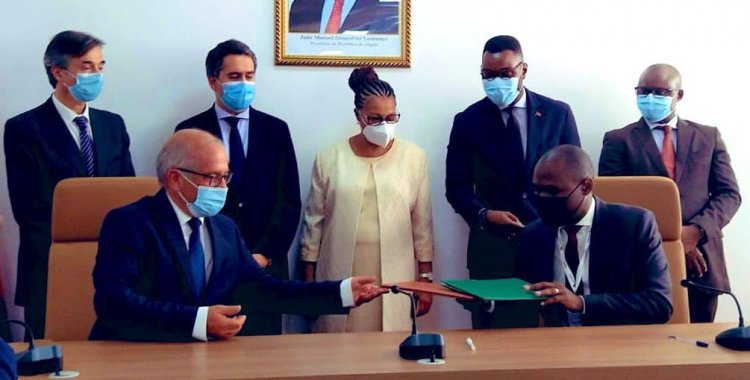The cooperation memorandum was signed at the headquarters of the Ministry of Education, in Luanda, by the directors of the National Institute for Assessment and Development of Education (INADE) and IAVE - Portuguese Institute for Educational Assessment.
The ceremony was preceded by a meeting between the Portuguese delegation led by the Portuguese Secretary of State for Foreign Affairs and Cooperation, Francisco André, who started a visit to Angola last Friday, and the Angolan delegation led by the Minister of Education, Luísa Grilo.
At least 250 education technicians from Angola, mostly teachers, are being trained by Portuguese trainers in Portuguese language and mathematics, with a view to holding the first national exams in Angola, scheduled for 23 June 24.
In addition to IAVE, the Directorate General for Education (DGE) and the Portuguese National Examination Jury (JNE) are also part of this protocol signed with INADE.
The pilot exam will only be for transition classes in general education, namely the 6th and 12th classes, with the sample comprising 2100 randomly selected students.
According to Luísa Grilo, the protocol signals the "responsibility and sense of commitment" assumed between the two parties (Angola and Portugal) in carrying out the pilot exams, hence the use of specialized Portuguese support for the external evaluation of the national education system.
"And for that we need specialized support, this support comes from the Portuguese Assessment Institute and what we did here was exactly to formalize this partnership that we have so that they can continue to support the organization of the entire external assessment process", she said.
Despite the territorial extension, "where the provinces are very far from each other", Luísa Grilo expresses great expectations about the exams and believes that this first evaluation "will go well, mainly due to the motivation" of the teachers and trainers.
Technicians from the Instituto Superior de Ciências da Educação (ISCED) will carry out the scientific recognition and validation of the tests "to maintain the rigor and quality of this proposed exam".
Regarding the choice of only two subjects, Portuguese and Mathematics, for these pilot exams, the minister explained that it stems from the fact that both are the "base of the entire education system".
"And if we are successful in this assessment, it will be much easier for us to do the pilot exam of chemistry, physics, geography, history, because we have this basis, this pilot exam is still a sample", she justified.
"We will do these tests on the 23rd and 24th of June so that the students can then do their final assessment without any problem, this exam is just a sample and does not count for any assessment", she explained.
Asked by Lusa about Angola's global investment in these exams, Luísa Grilo replied: "We cannot quantify the value yet, because we are carrying out the process step by step and, therefore, we are quantifying as needed".
"We will be able [to present the project costs] at the end of July, when we do the exam report, then we will be able to present the spreadsheet of everything we spent", she assured.
The Secretary of State for Foreign Affairs and Cooperation, Francisco André, said he believed in the success of Angola's pilot exams and said that the protocol is part of a vast cooperation activity between the two countries.
This protocol, he stressed, "results from a partnership between the Ministries of Education of Angola and Portugal in order to lay the foundations for a project of national exams, which until today had never had the opportunity to be held in Angola".
"Our contribution with this team and the Portuguese national exams commission is to come here to share good practices, show how the process can be done, adapted to the Angolan reality, but our cooperation in this area of education is not limited to this project", he stressed.
"All this will strengthen the education system, will create new opportunities, a stronger education system, more development and with more opportunities in Angola", said Francisco André.







